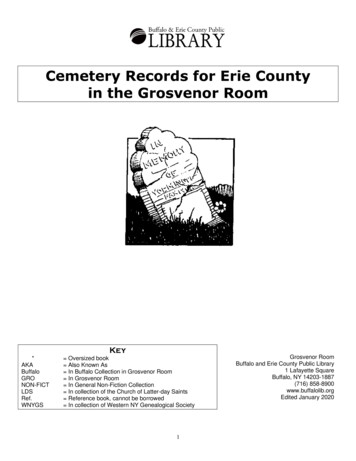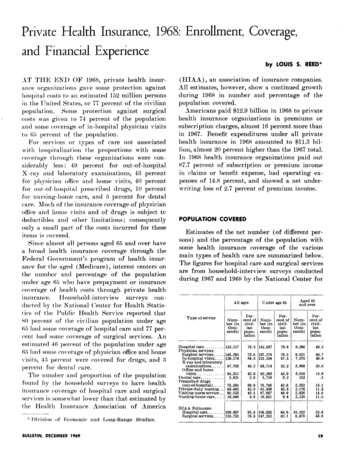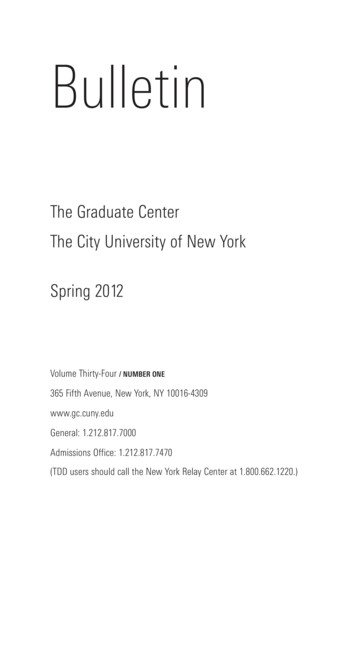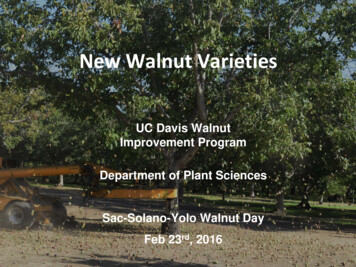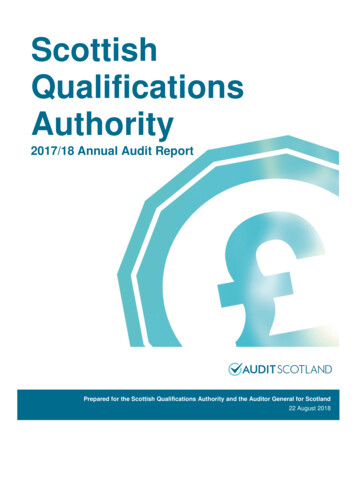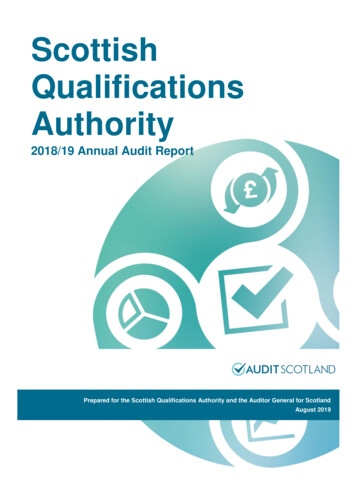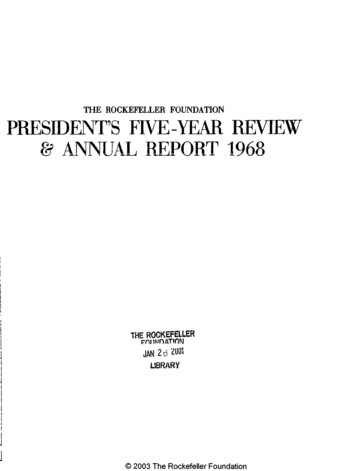
Transcription
THE ROCKEFELLER 68THE ROCKEFELLERFOUNDATIONJAN 2 c LIBRARY2003 The Rockefeller Foundation
THE ROCKEFELLER FOUNDATION111 WEST 50TH STREET, NEW YORK, NEW YORK 10020PRINTED IN THE UNITED STATES OP AMERICA2003 The Rockefeller Foundation
CONTENTSTrustees and Trustee Committees, 1968-1969VIIPrincipal Officers and Counsel, 1968-1969VIIIOfficers and Staff, 1968VIIIPRESIDENT'S FIVE-YEAR PROGRAM REVIEWAND 1968 ANNUAL REPORTTHE ROCKEFELLER FOUNDATION: PRINCIPLES AND PROGRAMby J. George HarrarXIXTHE CONQUEST OF HUNGER1964-1968: Five Years of Change 4, New Concepts Replacethe Old 16, New Developments Are Promising 17, Thrusts forthe Future 191968 Grants228PROBLEMS OF POPULATION38The World View 40, Principles of the Foundation's Program44, The Evolution of National Family Planning Programs 46,Universities and Population Programs 46, Reaching LargerNumbers 50, Thrusts for the Future 511968 Grants56UNIVERSITY DEVELOPMENTThe University of Valle 62, The University of the Philippines66, The University of East Africa 68, The University of Ibadan 73, Bangkok, Thailand 75, Other Institutions 771968 Grants5880CULTURAL DEVELOPMENT90Music 94, Theatre and Dance 101, Literature Program 106,Future Trends 1071968 Grants110EQUAL OPPORTUNITY FOR ALL114Higher Education 116, Better Preparation for College 120,Predominantly Negro Colleges 121, Other Support 125, TheCurrent Thrust 126, Ghetto Schools 727, Ghetto Leadership 129, Ghetto Studies 132, Additional Support 7521968 Grants138ALLIED INTERESTSArbovirology 142, Rural Health Centers 142, EnvironmentalSciences 142, Aid to Universities Abroad 142, InternationalUnderstanding 144, Other Institutions 1441421968 Grants145STUDY AWARDS 1968151ORGANIZATIONAL INFORMATION158FINANCIAL STATEMENTS 1968161SUMMARY OF FUNDS APPROPRIATED 1968190INDEX193v2003 The Rockefeller Foundation
2003 The Rockefeller Foundation
TRUSTEES AND TRUSTEE COMMITTEESApril 1968—April 1969BOARD OF TRUSTEESBARRY BINGHAMCLARK KERRLLOYD D. BRACE1JOHN R. KIMBEHLY!RALPH J. BUNCHEALBERTO LLERAS CAMARGOJOHN S. DICKEYJOHN D. ROCKEFELLER SRDC. DOUGLAS DILLONJOHN D. ROCKEFELLER IVsROBERT H. EBERTROBERT V. ROOSALORD FRANKS OF HEADINGTONFREDERICK SEITZROBERT F. GOHEENFRANK STANTONCLIFFORD M. HABDiN2THOMAS J.WATSON, JR.J. GEORGE HARRARW. BARRY WOOD, JR.THEODORE M. HESBURGHWHITNEY M. YOUNG, JR.8ARTHUR A. HOUCHTON, JR.EXECUTIVE COMMITTEETHE PRESIDENT ChairmanFRANK STANTONC. DOUGLAS DILLONROBERT H. EBERTROBERT F. GOHEENalternate memberJOHN D. ROCKEFELLER SRDTHEODORE M. HESBURGHalternate memberROBERT V. ROOSAFREDERICK SEITZFINANCE COMMITTEEThrough June 30Beginning July 1LLOYD D. BRACE Chairman1C. DOUGLAS DILLON ChairmanC. DOUGLAS DILLONROBERT V. ROOSAROBKHT V. ROOSATHOMAS J. WATSON, JR.JOHN R. KiMBERLY1alternate memberARTHUR A. HOUGHTON, Jn.alternate memberTHOMAS J. WATSON, JR.alternate memberFRANK STANTONalternate memberTHE PRESIDENTTHE PRESIDENTTHE CHAIRMAN OF THEBOARD OF TRUSTEESTHE CHAIRMAN OF THEBOARD OF TRUSTEES1 Retired June 30,1968.2 Resigned Jumiiuy 17, 1969.3 Beftinnine July 1,1968.vn2003 The Rockefeller Foundation
PRINCIPAL OFFICERS AND COUNSELApril 1968—April 1969PRINCIPAL OFFICERSJOHN D. ROCKEFELLER SRD Chairman of theBoard of TrusteesTHEODORE R. FRYE TreasurerWILL M. MYERS Vice-PresidentHERBERT HEATON Comptroller„.,.STERLING WORTMAN Director forAgricultural SciencesKENNETH W. THOMPSON Vice-PresidentNORMAN LLOYD Director for ArtsKENNETH WERNIMONT Vice-President forAdministrationJOSEPH E. BLACK Director for Humanitiesand Social SciencesJ.KELLUM SMITH, JR. SecretaryJOHN M. WEIR Director for Medicaland Natural SciencesJ. GEORGE HARRAR PresidentCOUNSELCHAUNCEY BELKNAPJOHN N. IRWIN II AssociateOFFICERS ANDSTAFF 1968ADMINISTRATIONJ. GEORGE HARRAR PresidentJANET M. PAINE Special AssistantWILL M. MYERS Vice-PresidentJANE ALLEN Assistant to the PresidentKENNETH W. THOMPSON Vice-PresidentMARSHALL H. PECK, JR. Assistant to the President1KENNETH WERNIMONT Vice-President forAdministrationALFRED M. BOYCE ConsultantHENRY ROMNEY Information OfficerE. C. STAKMAN Special Consultant„ROBERT L. WILSON Consultant1. ,.MILDRED E. RUNCIMAN Head, Reference service, ,,ROBERT M. THOMAS Head, Purchasing andShipping DepartmentESTHER S. STAMM Assistant SecretaryFRANCES MULLIGAN Head, Travel ServiceLEO F. BOURNE Assistant TreasurerADEL TACKLEY Head, Personnel ServiceROGEH T. BmiNGEn Assistant ComptrollerHENRY S. TARTAGLIA Head, Office Service DepartmentNILSJ.WESTKRBERG Assistant ComptrollerKICHARD DOUSON Information Associate J.KELLUM SMITH, JR. SecretaryTHEODORE R. FRYE TreasurerHERBERT HEATON Comptroller1 Beginning October 1968.3 Beginning December 1968.VIH 2003 The Rockefeller Foundation
AGRICULTURAL SCIENCESSTERLING WORTMAN, PH.D., DirectorRALPH W. RICHARDSON, JR., PH.D., Associate DirectorNORMAN E. BORLAUG, PH.D., Associate DirectorLEWIS M. ROBERTS, PH.D., Associate DirectorROBERT F. CHANDLER, JR., PH.D., Associate DirectorJOSEPH A. RUPERT, PH.D., Associate DirectorRALPH W. CUMMINGS, PH.D., Associate DirectorERNEST W. SPRAGUE, PH.D., Associate DirectorULYSSES J. GRANT, PH.D., Associate DirectorEDWIN J, WELLHAUSEN, PH.D., Associate DirectorJOHN J. McKELVEY, JR., PH.D., Associate DirectorGUY B. BAIRD, PH.D., Assistant DirectorJOHN S. NIEDERHAUSER, PH.D., Associate DirectorJOHN W. GIBLER, PH.D., Assistant DirectorROBERT D. OSLER, PH.D., Associate DirectorRICHARD BRADFIELD, PH.D., Special ConsultantDOROTHY PARKER, PH.D., Associate DirectorDONALD G. FLETCHER, Special Consultant1JOHN A. PINO, PH.D., Associate DirectorHERMAN A. RODENHISER, PH.D., Special ConsultantNORMAN LLOYD, M.A., DirectorHOWARD KLEIN, M.S., Assistant DirectorGERALD FREUND, D.PHIL., Associate DirectorWOODIE KING, JR., Consultant2ARTSHUMANITIES AND SOCIAL SCIENCESJOSEPH E. BLACK, PH.D., DirectorJOHN P. HARRISON, PH.D., Associate DirectorRALPH K. DAVIDSON, PH.D., Deputy DirectorJOHN MARSHALL, M.A., Associate Director3WILLIAM L. BRADLEY, PH.D., Associate DirectorWILLIAM C. OLSON, PH.D., Associate DirectorJAMES S. COLEMAN, PH.D., Associate DirectorROBERT W. JULY, PH.D., Assistant Director*LELAND C. DEVINNEY, PH.D., Associate DirectorGLENN L. JOHNSON, PH.D., ConsultantGERALD FREUND, D.PHIL., Associate DirectorFRANK S. JONES, M.B.A., Consultant5CHADBOURNE GILPATRIC, Associate DirectorTHOMAS SOWELL, PH.D., Consultant2MEDICAL AND NATURAL SCIENCESJOHN M. WEIR, M.D., PH.D., DirectorVIRGIL C. SCOTT, M.D., Associate DirectorWILLOUGHBY LATHEM, M.D., Deputy DirectorLUCIAN M. SPRAGUE, PH.D., Associate DirectorJAMES S. DINNING, PH.D., Associate DirectorLEROY R. ALLEN, M.D., Assistant DirectorWILBUR G. DOWNS, M.D., Associate DirectorPATRICK N. OWENS, D.ENG., Assistant DirectorLUCIEN A. GREGG, M.D., Associate DirectorTHELMA INGLES, R.N., M.A., ConsultantGUY S. HAYES, M.D., Associate DirectorNEVIN S. SCRIMSHAW, M.D., ConsultantJOHN MAIER, M.D., Associate DirectorFELLOWSHIP OFFICEJESSE P. PERRY, JR., M.F., Fellowship Officer1 Died October 1968.3 Beginning April 1968.8 Retired as on officer June 1968.ROBERT L. FISCHELIS, M.A., Fellowship Associate* Resigned August 1968.B Beginning November 1968.is2003 The Rockefeller Foundation
FIELD STAFFBRAZILBelemVIRUS RESEARCH PROGRAMTHOMAS H. G. AITKEN, M.D.JOHN P. WOODALL, PH.D.JORGE BOSHELL, M.D.CEYLONKandyAGRICULTURAL SCIENCESJAMES C. MOOMAW, PH.D.CHILESantiagoAGRICULTURAL SCIENCESHUMANITIES AND SOCIAL SCIENCESJOSEPH A. RUPERT, PH.D.1DELBERT A. FITCHETT, PH.D.ROBERT E. SWOPE, v.M.n.2JOHN P. HARRISON, PH.D.COLOMBIABogotaCOLOMBIAN AGRICULTURAL PROGRAMROBERT K. WAUGH, PH.D., DirectorCHARLES H. MULLENAX, M.S., D.V.M.FRANCIS C. BYRNES, PH.D.SHERBERT A. PAUL, M.S.PAUL L. CARSON, PH.D.2NED S. RAUN, PH.D.DALE D. HARPSTEAD, PH.D.SEDGAR D. ROBERTS, D.V.M., PH.D.ROLAND E. HARWOODJAMES M. SPAIN, PH.D.3JEROME H. MANER, PH.D.VIRUS RESEARCH PROGRAMRONALD B. MACKENZIE, M.D:CaliINTERNATIONAL CENTER OF TROPICAL AGRICULTUREULYSSES J. GRANT, PH.D., Director*LOYD JOHNSON, M.S. FRANCIS C. BYRNES, PH.D.5JAMES M. SPAIN, PH.D.GDALE D. HARPSTEAD, PH.D.BROY L. THOMPSON, PH.D.PETER R. JENNINGS, PH.D.l Through March 1968.2 Temporary appointment completed,« Through September 1968.* In Bogota until July 1969.B Beginning October 1968, Beginning August 1968.2003 The Rockefeller Foundation
Cali (cont,)HUMANITIES AND SOCIAL SCIENCESJAMES M. DANIEL, PH.D.GERALD I. TRANT, PH.D.MEDICAL AND NATURAL SCIENCESGUY S. HAYES, M.D.1LUCILLE T. MERCADANTE, H.N., M.A.4JOEL E. GORDON, PH.D.2PATRICK N. OWENS, D.ENG.PERCY L. LILLY, PH.D*WILLIAM VAN B. ROBERTSON, PH.D.4VIRUS RESEARCH PROGRAMHAROLD TRAPIDO, PH.D.INDIANew DelhiINDIAN AGRICULTURAL PROGRAMGUY B. BAIRD, PH.D., DirectorLELAND R. HOUSE, PH.D.SBILLY C. WRIGHT, PH.D., Assistant DirectorWILLIS L. McCuiSTioN, PH.D.6R. GLENN ANDERSON, PH.D.CHARLES R, POMEROY, M.S.JOHNSON E. DOUGLAS, M.S.FREDERICK F. RANDALLROBERT W. HERDT, M.S.*BOBBY L. RENFRO, PH.D.W. DAVID HOPPER, PH.D.WILLIAM R. YOUNG, PH.D.HUMANITIES AND SOCIAL SCIENCESMEDICAL AND NATURAL SCIENCESCHADBOURNE GILPATRICLnRoY R. ALLEN, M.D.THyderabadINDIAN AGRICULTURAL PROGRAMWAYNE H. FREEMAN, PH.D.JAMES S. QUICK, PH.D.ITALYBellagio (Lake Como)VILLA SERBELLONIJOHN MARSHALL, M.A., Director81 Through August 1968,2 Beginning July 1968.8 Beginning June 1968,4 Temporary appointment completed.B On study leave beginning August 1968. Through September 1968.7 Through March 1968.8 Poslretlrement appointment from July 1968.SI 2003 The Rockefeller Foundation
KENYAMugugaAGRICULTURAL SCIENCESORDWAY STARNES, PH.D.NairobiHUMANITIES AND SOCIAL SCIENCESJAMES S. COLEMAN, PH.D.ROBERT W. JULY, PH.D.SGLENN E. BROOKS, JR., PH.D.*DANIEL C. ROGERS, M.A.1MAURE L. GOLDSCHMIDT, PH.D.1MICHAEL P. TODARO, PH.D.4ROBERT H. JACKSON, M.A.2MEXICOMexico CityINTERNATIONAL MAIZE AND WHEAT IMPROVEMENT CENTEREDWIN J. WELLHAUSEN, PH.D., DirectorCHARLES F. KRULL, PH.D.7ROBERT D. OSLER, PH.D., Associate DirectorREGGIE J. LAIRD, PH.D.NORMAN E. BOHLAXIC, PH.D.NEIL B. MACL-ELLANJOHN W. GIBLER, PH.D.BDELBERT T. MYREN, PH.D.JOHN S. NlEDERHAUSER, PH.D,REGINALD H. PAINTER, PH.D.8JOSEPH A. RUPERT, PII.D.«Louis T. PALMER, PH.D.SELMER C. JOHNSON, PH.D.BILL J. ROBERTS, PH.D.NIGERIAIbadanINTERNATIONAL INSTITUTE OF TROPICAL AGRICULTUREARTHUR D. LEACH, PH.D.2UNIVERSITY DEVELOPMENT —ADMINISTRATIONJOSEPH R. BOOKMYER, M.A.10 ALBERT J. NYBERG, PH.D.2VIRUS RESEARCH PROGRAMDONALD E. CAREY, M.D.JJGRAHAM E. KEMP, D.V.M.OVTIS R. CAUSEY, SC.D.VERNON H. LEE, PH.D.1 Temporary appointment completed.2 Beginning September 196R.8 Resigned August 1968.4 Beginning Juno 1968.G Beginning July 1968.« Beginnlnc April 1968. T Resigned April 1968.8 Beginning September 1968; died December 1968. Bcpinninp October 1968.10 Through October 1968." Bcgiiiuing August 1968.XII2003 The Rockefeller Foundation
PHILIPPINESQuezon CityHUMANITIES AND SOCIAL SCIENCESDANTE L. GERMING, PH.D.1ROBERT W. MILLER, M.A.MEDICAL AND NATURAL SCIENCESLUCIEN A. GREGG, M.D.LEROY R. ALLEN, M.D.2Los BanosINTERNATIONAL RICE RESEARCH INSTITUTEROBERT F. CHANDLER, JR., PH.D., DirectorWILLIAM G. GOLDEN, JR., M.S.A. COLIN McCLUNC, PH.D., Associate DirectorLOYD JOHNSON, M.s.8RANDOLPH BARKER, PH.D.DUANE S. MIK.KELSEN, PH.D.4HENRY M. BEACHELL, M.S.JAMES C. MOOMAW, PH.D.BRICHARD BRADFIELD, PH.D.BURT RAY4ST. LUCIACastriesMEDICAL AND NATURAL SCIENCESPETER JORDAN, M.D.CAROL M. SHAFFER, M.s.4JOSEPH A. COOK, M.D.6ROBERT F. STURROCK, PH.D.RONALD E. M. LEES, M.D., o.p.n.4GLADWIN 0. UNRAUDONALD G. SANDT*EDWARD S. UPATHAM, M.s.6TANZANIADar es SalaamHUMANITIES AND SOCIAL SCIENCESGERALD K, HELLEINER, PH.D.41 Through August 1968.2 Beginning April 1968,9 Through July 1968 (on study leave).4 Temporary appointment completed.CARL G, ROSBERG, JR., PH.D.D On assignment in Ceylon, Beginning September 1968.T Beginning August 19C8.2003 The Rockefeller Foundation
THAILANDBangkokAGRICULTURAL SCIENCESERNEST W. SPRAGUE, PH.D., Agricultural Project LeaderBEN R. JACKSON, PH.D.JAMES L. BHEWBAKER, PH.D.1CHARLES L. MOORE, PH.D.DWIGHT C. FlNFROCK, M.S.2DALE G. SMELTZEB, PH.D.1RICHARD R. HARWOOD, PH.D.HUMANITIES AND SOCIAL SCIENCESLAURENCE D. STIFEL, PH.D.DELANE E. WELSCH, PH.D.MEDICAL AND NATURAL SCIENCESJAMES S. DINNING, PH.D.WARD W. MOORE, PH.D.SGORDON B. BAILEY, PHJXJAMES A. OLSON, PH.D.JAMBS W. BARRY, u.s.8J. LON POPE, PH.D.1JOHN P. BEDERKA, JR., PH.D ,4CARROLL F. REYNOLDS, PH.D.JJOHN H, BRYANT, M.D.EUGENE RODRIGUEZ, SC.D.WILLIAM P. CALLAHAN, III, PH.D.WALTER S. ROOT, PH.D.5ROBERT C. HOLLAND, PH.D.WILLIAM D. SAWYER, M.D.BARBARA KENNEDY, PH.D RUBY L. WILSON, ED.D.6ALBERT S. KUPERMAN, PH.D.4JOE D. WHAY, M.D.GORDON J. LEITCH, PH.D.VERNON L. YEAGER, PH.D.?UNIVERSITY DEVELOPMENT—ADMINISTRATIONHENEY P. LANCE, JR.TRINIDADPort-of-SpainVIRUS RESEARCH PROGRAMANDRIES H, JONKERS, M.D.TUNISIATunisAGRICULTURAL SCIENCES PROGRAMWILLIS L. McCuisxioN, PH.D.81 Temporary appointment completed.2 Resigned December 1968.u Hcclnntng July 1908.4 Beginning August 1968.B Beginning October 1968. Beginning November 1968.T Bcgtnnlnc May 1968.SlV2003 The Rockefeller Foundation
UGANDAKampalaAGRICULTURAL SCIENCESJOHN L. NICKEL, PHJ .KENNETH 0. RACHIE,CARLTOK S. KOEHLER, PH.D.1HUMANITIES AND SOCIAL SCIENCESBARTELL C. JENSEN, PH.D.1BERNARD OKUN, PH.D.UNITED STATESBerkeley, CaliforniaVIRUS RESEARCH PROGRAMHARALD N. JOHNSON, M.D.Lincoln, NebraskaAGRICULTURAL SCIENCESKENNETH 0. RACHIE, PH.D.SBoston, MassachusettsMEDICAL AND NATURAL SCIENCESDONALD E, CAREY, M.D.4New Haven, ConnecticutVIRUS RESEARCH PROGRAMWILBUR G. DOWNS, M.D.DELPHINE H. CLARKE, M.D.CHARLES R. ANDERSON, M.D.ROBERT E. SHOPE, M.D.SONJA M. BUCKLEY, M.D.ROBERT W. SPEIR, M.D,JORDI CASALS-ARIET, M.D.LORING WHITMAN, M.D.Charlottesville, VirginiaHUMANITIES AND SOCIAL SCIENCESDANTE L. GERMING, PH.D.51 Beginninc July 1568.2 Beginning September 1968.3 TluoUfch August 1968.4 On study leave thronptli July 1968.B On leave of absence beginning September 1968.XV 2003 The Rockefeller Foundation
2003 The Rockefeller Foundation
THEROCKEFELLERPRINCIPLESANDFOUNDATION:PROGRAM2003 The Rockefeller Foundation
2003 The Rockefeller Foundation
THE ROCKEFELLER FOUNDATION:PRINCIPLES ANDPROGRAMAmong the thousands of foundations that have been fields of public health, education, food production,established in the United States, there are only a population stabilization, and the arts, work must befew with unrestricted endowments, broad mandates, supported over long periods of time, and continuousand international interests. Most foundations op- adjustments to changing circumstances must beerate under some form of donor-imposed limitation made. Such programs require the long-term ser—several major foundations are restricted to spe- vices of qualified professional staff dedicated to thecific geographical areas; others must focus their Foundation's goals.interest on single fields, such as medical sciences,The carefully designed programs carried out bythe social sciences, or education.the major general-purpose foundations have beenThe general-purpose foundations are general only rich in their variety and diverse in their approach.in the sense that their boards of trustees are free to In some instances, they consist of working with inuse their best judgment to determine those broad stitutions of higher education to help them carry onareas most closely related to contemporary needs, more effectively the activities of major social signifiOnce these areas have been defined, the boards cance that they themselves have chosen. Supportmust inevitably require that the foundations oper- has also been provided to scholarly and scientific orate within these limits.ganizations that are conducting important researchThe Rockefeller Foundation is one of the largest in the biological, physical, and medical sciences, theof the general-purpose foundations. Its financial humanities, and the social sciences. In each case,resources, however, represent only a small element the objectives of the institution clearly fall withinin the total of private and public funds available the program interests of the foundation. Foundafor investment in health, nutrition, science, educa- tions may also on occasion participate directly intion, and the arts. But, when measured by the yard- well-defined programs for the control of disease, thesticks of qualitative achievement and effectiveness alleviation of hunger, or the improvement of educain bringing about significant progress through con- tion. Foundation staff then may work side by sidestructive change, the Foundation's record of accom- with foreign colleagues on projects that have beenplishment is evident, For more than 55 years it has given high priority by the host countries.attacked basic human problems through a carefullyOne major misconception still persists with refocused program characterized by continuity of spect to the general-purpose foundations. Manyeffort, flexibility and readiness to innovate, and people think of them as repositories of funds whichemphasis on quality in leadership and performance, are available for almost any purpose upon perFrom the time of its establishment in 1913, suasive demand, rather than as philanthropies withThe Rockefeller Foundation has been a thoroughly carefully designed and continuing programs. Eachprofessional organization. It maintains a highly year foundations are deluged with more requests forqualified staff of scientists, social scientists, and funds than the year before, and there appears to behumanists, capable of dealing at home and abroad a growing tendency for groups to initiate projectswith precisely defined human concerns. Senior offi- on the assumption that foundation assistance autocers working with younger staff members perpetu- matically will be forthcoming. In fact, the numberate the professional character of the group, which of proposed but unfunded memorials, endowments,is recruited principally from the academic comniu- councils, study centers, and other programs is innity. The very nature of the Foundation's programs creasing in almost explosive fashion, and theirrequires a high level of professional quality and combined budgets could readily absorb the capitalsustained effort toward defined goals. In order to resources of all foundations. Many of these requestsachieve progress on an international scale in the are obviously well-conceived and important, andXIX2003 The Rockefeller Foundation
merit consideration for support from various sources,including foundations. But it is obvious that TheRockefeller Foundation, if it is to continue to betrue to its original mandate of combining continuitywith a readiness to change when circumstances require it, will necessarily have to decline to providefunds for purposes which, although worthy, are extraneous to its basic policy and program.During the pastfiveyears there have been notableand even dramatic results arising from Foundationefforts, both at home and overseas. Most spectacularhave been those growing out of the Foundation'sworldwide Conquest of Hunger Program, which hascontributed millions of tons of food grains to theworld food budget and has added hundreds ofmillions of dollars to the gross national product ofthe countries involved. The program is now widelyrecognized and is popularly spoken of as the "greenrevolution," built upon "miracle rice," and "miraclewheat."THE CONQUEST OF HUNGERimpact increase, so will their core and other formsof support. Foundation investments in the fouroriginal institutions will thus be gradually stabilized, enabling the Foundation to place principalemphasis on the use of key personnel in leadershippositions to assure the continuing success of research and development programs overseas.As it continues to make all possible effort towardpopulation stabilization during the next few years,the world must also be able to feed itself. Thetropics will of necessity have to furnish an increasing proportion of the world's food, and the majorthrust of the Foundation's program in agricultureis therefore expected to be directed toward bringingthese areas closer to full production through multiple cropping systems. These systems are designedto maximize the productivity of land units throughsuccessive crop rotations during the entire year, laking advantage of the 365-day growing season. It hasalready been shown in the Philippines and elsewhere that per-acre yields under improved systemsof managemem may be four to six times greaterThe genesis of the agriculture program of TheRockefeller Foundation took place in Mexico in ajoint effort with the Government of that country toclose its gap in food grain production. It expandedto Central and South America and then to Asia andAfrica. The original "country program" concept hasevolved into one in which the basic instrument isthe international research center focused on increasing world food production, principally through adaplive research applied to the less-developed countries,There are al present four research centers, located in the Philippines, Mexico, Colombia, andNigeria. Initially funded by the Ford and Rockefeller Foundations, these centers are receiving partial support from the W. K. Kellogg Foundation,the United States Agency for International Development, the Food and Agriculture Organization ofthan yields under present systems.Major responsibility for the success of these cooperative programs has in each case been dueprincipally to local governments, institutions, andindividuals. They have made the decisions withrespect to priorities, have provided the leadershipand other forms of support vital to the progress ofthe program, and have obtained the involvementof teachers, investigators, extension agents, andagricultural producers so that all may strive inharmony to achieve critically important nationalgoals. Ultimately, it is expected that, in the bestinterests of all concerned, more and more of thetotal effort will be assumed by national or regionalinstitutions and organizations.the United Nations, and the Government of Canada.It is expected that other organizations, too, will joinin the effort and that local governments, which havealready been generous in providing land and certain other facilities, will increase their contributionsto the local costs of the research centers.Thus the pattern of research and development infood production, evolved and initially supported byThe Rockefeller Foundation, is being convertedwith multiple support into a network of adaptivereRenrch centers. It is expected that the internationalresearch institutes will be copied elsewhere andfunded by others, and that, as their numbers andThe University Development Program of theFoundation is an especially exciting and productiveventure. It has now become dearly evident that university and national leaders in most of the lessdeveloped countries enthusiastically recognize thatimprovement in the quality of university personneland programs will produce significant benefits bothfor the nation and for the entire region. With Foundation assistance, a number of methods have beendevised to improve tlio quality of university staffand curricula, to bring about better fiscal policiesand control, and to obtain new sources of support.The effectiveness of the«e efforts is now such thatUNIVERSITY DEVELOPMENT2003 The Rockefeller Foundation
there is growing involvement and effort by local rently placing increasing emphasis on the interacleaders, and the Foundation welcomes the oppor- tion of the social, medical, and biological sciences.tunity to work with them in these demonstrably im- There is evidence that a concerted approach of thisportant endeavors.type offers growing opportunity for progress in theThe Foundation's approach to university devel- areas of both research and communication.opment is a flexible one, and on occasion the program has been combined with other Foundation EQUAL OPPORTUNITYactivities, such as family planning, agricultural deThe Equal Opportunity Program, begun in 1963,velopment, and rural public health. During the past has grown substantially and is becoming increasinglyfive years, the University Development Program has diversified. Initial efforts were concentrated in thebeen most active at the University of Valle in Co- field of education, working with predominantly Nelombia, several universities in Thailand, the Univer- gro as well as predominantly white institutions in ansity of the Philippines, the University of Ibadan in effort to provide more educational opportunities toNigeria, and the University of East Africa.qualified students, and to help others to qualify forConsideration is also being given to the establish- continuing education. Several thousands of disadment of University Development Program centers vantaged Americans have now been reached by thisat other overseas institutions that have expressed complex of efforts, which has involved professional,interest in this form of collaboration.graduate, baccalaureate, remedial, and secondaryeducation. The Foundation has also worked withestablished agencies dedicated to serving the needsThe Foundation's Population Program has grown and improving the conditions of the disadvantaged,in dimension and diversity. Its components include for example the National and local Urban Leagues,support of research, training, and action programs the NAACP, the national Urban Coalition, andboth at home and abroad. Of special interest is the others. Support lias also been provided throughfact that by 1968, seven United States medical certain agencies to enable a number of veteransschools had, with Foundation assistance, initiated returning from Vietnam to acquire further educaor expanded teaching, research, and family coun- tion and receive assistance in placement, in orderseling programs in this area. Research is princi- that they may fully realize their potential, for theirpally in the fields of human biology, reproductive own development and that of their community andphysiology, immunology, and molecular biology, nation.and its basic purpose is to discover efficient, safe,Another exciting aspect of the Program is theand low-cost methods for the control of fertility.support being provided to medical institutions workMajor organizations such as the Population Coun- ing in the ghettos and other areas on the problemcil and the National and International Planned of delivering health care to large numbers of disParenthood Federations have been supported in a advantaged citizens. This would appear to be avariety of ways. These and other existing organiza- highly important and productive area of concerntions, as well as others that may come into being, and action, both now and in the future.represent exceedingly important instrumentalitiesAs the Equal Opportunity Program has evolved,for the extension of family planning information and more and more attention has been placed uponcontraceptive methods to increasing numbers of ghetto areas. Upon recommendation of the specialthose who would welcome the knowledge and the Trustee-Officer Committee which functioned duringopportunity to limit family size.1968, the Foundation decided to emphasize broadlyThe Foundation has worked with the above or- based efforts to improve education in the ghetto, toganizations and with others here and abroad, wher- identify leadership within the ghetto, and to provideever there is interest in creating through their ownsupport for clearly constructive programs. Officersefforts and institutions a greater awareness of popu- have traveled extensively within many ghetto areaslation problems and in promoting family planning of this country and talked with leaders of the black,activities. Much of this support has been through Mexican-American, Puerto Rican, and Americangrants to local groups and funds for the training of Indian communities. They also continue to examineindividuals to work in one or another sector of the areas in the rural and semi-rural South, in the contotal program.vlctiou that in those areas needs exist which meritIn its Population Program the Foundation is cur- assistance.XXI2003 The Rockefeller Foundation
A special activity is a ghetto study led by Dr.Kenneth Clark. It will focus primarily on areas inNewark and White Plains, one an example of asolidified ghetto area, the other a black neighborhood in the stage of formation. This study, supportedby the Foundation, is expected to be available inapproximately one year.The total problem of minorities is vast, perplexing, and difficult. It is also challenging. 'While theFoundation can play only a small role in the totaleffort in terms of resources, it is clear that this rolecan be designed so as to be meaningful and construelive; over a period of time, such an effort couldcontribute significantly to patterns for improvement,forms. Results to date suggest that this program istaking form, that it is effective, and is now beginning to have demonstrable impact.CULTURAL DEVELOPMENTTo conclude, a comparison of the Foundation'sefforts in the five-year periods before and after 1963clearly demonstrates the evolution of Foundationprograms and the reorientation of skills and experience as social patterns have changed. The Foundation has also attempted to look to the futureso as to be helpful in correcting certain currenttrends before they lead to irreversible disaster.Of particular importance is the area of the qualityof the environment, where the Foundation can invest in research and action programs directed to soimion of problems presented by the contin-The Cultural Development Program is the Foundation's newest venture. Since 1964, it has beencarefully developed through the technique of making grants-in-aid to individuals and institutions,often followed by larger appropriations as the recipient demonstrates high quality and imagination,College, university, and community groups are theprincipal, but not the only, recipients of Foundationsupport. Major emphasis is upon music, theatre,and dance, including both training and participantactivities, along with audience development. Theuing degradatio
Arbovirology 142, Rural Health Centers 142, Environmental Sciences 142, Aid to Universities Abroad 142, International Understanding 144, Other Institutions 144 1968 Grants 145 STUDY AWARDS 1968 151 ORGANIZATIONAL INFORMATION 158 FINANCIAL STATEMENTS 1968 161 SUMMARY OF FUNDS APPROPRIATED 1968 190 INDEX 193 v 2003 The Rockefeller Foundation
